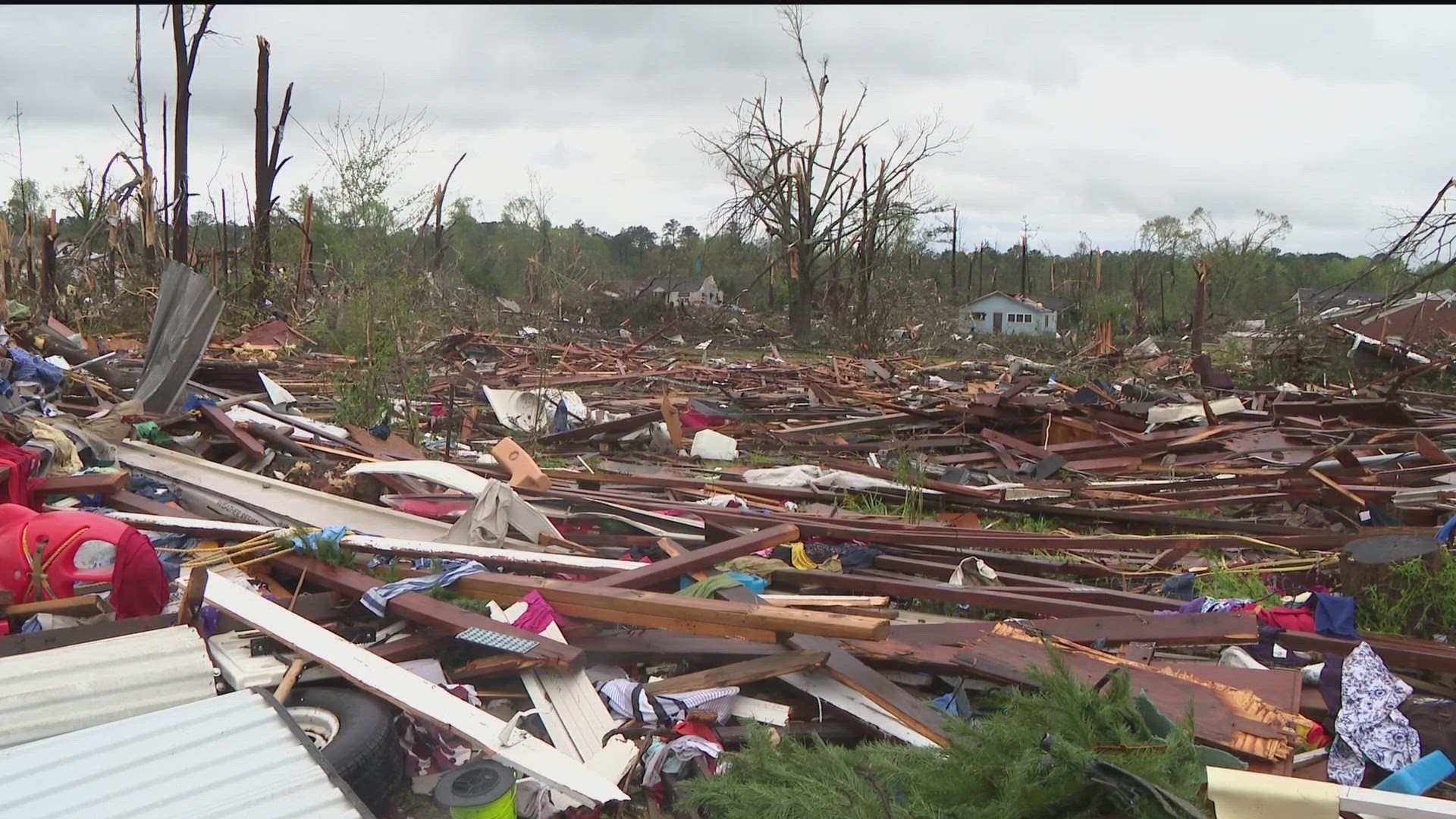ATLANTA — Attorney General Chris Carr and Insurance Commissioner John King are urging Georgians to be aware of potential fraud after a tornado and severe weather swept through the Peach State.
In a release, they said for residents to be on the lookout for home repair fraud, insurance scams, price gouging and other schemes.
“Unfortunately, con artists will try to take advantage of those impacted by a weather-related disaster or individuals looking to donate to their neighbors in need,” Carr said in the release.
“Criminals know potential victims are at their most vulnerable after a natural disaster, which is why it’s important to be on guard against insurance-related scams immediately following a loss,” King added.
Storm fraud
The Attorney General's Office said oftentimes "storm chasers" may ask homeowners for up-front payments for repairs and then leave without doing work. They also might charge a high price for tree removal, unnecessary repairs, or below-standard work. "Storm chasers" may also offer to cover a homeowner's insurance deductible and persuade them to give fake reports to an insurance company – potentially implicating the homeowner in an insurance fraud case, the release stated.
Officials offered the following tips below to avoid home repair fraud and insurance scams:
- Steer clear of any contractor who asks for full payment up-front, only accepts payment in cash, or refuses to provide you with a written contract.
- Avoid door-to-door offers for home repair work. Instead, ask friends and neighbors for referrals.
- Be skeptical of any contractor that offers to pay your insurance deductible or offers other no-cost incentives, as these can be signs of a scam. Always talk to your insurance company before committing to any storm-related repairs or inspections.
- Ask contractors for references and check them out.
- Check with the Better Business Bureau to see if there are any complaints against the business.
- Ensure that the contractor has the required licensing and/or affiliation:
- Tree Removal: Check with the International Society of Arboriculture to make sure the person has a valid arborist license.
- Water Damage and Mold: Only hire businesses that are local and qualified in mold remediation and property restoration. To find local contractors and restorers, check with the Society of Cleaning and Restoration Technicians and the Restoration Industry Association.
- Contractors: General contractors, electricians, plumbers, and heating and air conditioning contractors must be licensed with the Georgia Secretary of State’s Office. To look up a contractor, visit sos.ga.gov. Please note that certain specialty occupations such as roofers, tree removal services, painters, drywall contractors and repair handymen are not required to be licensed by the state.
- Legitimate contractors should be able to provide the following:
- A business license
- General liability insurance
- Workers compensation insurance
- Written manufacturer warranties
- Written labor warranties
- Public adjusters are also required to carry a license to do work in Georgia. Call the Insurance Commissioner’s Office at 1-800-656-2298 to verify if a public adjuster is licensed and that their contract has been approved before hiring them to do any work on your behalf.
Charity fraud
Additionally, the Attorney General's Office said fraudulent charities are an issue following a tragedy or natural disaster. Scammers are able to set up a website, copy a logo or create a name that mimics a well-known charity. Georgians should also be careful when responding to online or social media ads.
Officials also offered this advice to avoid charity fraud:
- Consider donating only to charities you know and trust.
- The following websites can help you determine whether an organization is reputable and how likely it is to use your money effectively and efficiently:
- Find out whether the charity plans to share your contact information with other charitable organizations or marketing companies. This commonly occurs, which is why people often receive solicitations from other charities after making a donation. You can review a charitable organization’s donor privacy policies by visiting Charity Navigator and BBB Wise Giving Alliance.
- Never give out your credit card or bank account information in response to an unsolicited phone call, email or text. Instead, ask the person to mail you the information.
Here's how to report fraud
If a homeowner encounters fraud or suspected price gouging, the Attorney General’s Office said to call its Consumer Protection Division at (404) 651-8600 or file an online complaint here.
Residents can also report suspicious charitable solicitations to the Georgia Secretary of State’s Charities Division by calling (470) 312-2640 or online here.
If a homeowner believes a contractor has committed insurance fraud file a report with the Insurance Commissioner’s Office at (404) 656-2070 or 1 (800) 656-2298 or file a report online here.
Anyone who has trouble receiving a response from an insurance company or if there are any questions about insurance policy call 1( 800) 656-2298 or fill out a form online here.

